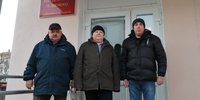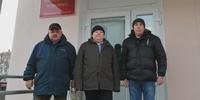The Case of Kozhushko and Others in Lesnoy
Filter
- #
The Investigation Department of the Lesnoy Investigation Department of the Investigative Committee of the Russian Federation for the Sverdlovsk Region is initiating a criminal case against Andrey Kozhushko, Andrey Bannykh and Pavel Loshchinin under Part 1 of Article 282.2 of the Criminal Code of the Russian Federation (organizing the activities of an extremist organization).
- #
Searches are being conducted at at least 6 addresses of local Jehovah's Witnesses. During the search, all electronic devices and personal records are seized from believers. The security forces seized a large amount of personal savings from one family. At least five citizens are being interrogated.
- #
Andrey Kozhushko, Andrey Bannykh and Pavel Loshchinin are charged under the article on organizing the activity of an extremist organization. The ruling states that the believers carried out "their personal participation in it as religious leaders."
The document describes each of the defendants: "Through videoconferencing ... carried out religious meetings for worship, public study and discussion of literature, video recordings and illustrations."
- #
The case is sent to the city court of the city of Lesnoy, Sverdlovsk Region, for consideration by judge Lyudmila Erzikova.
- #
22 people come to the court session to support the believers, but not everyone is allowed into the courtroom.
The prosecutor reads out the indictment, the defendants express their disagreement with the charges.
Andrey Bannykh says: "I am only accused of gathering with fellow believers at meetings for worship of Jehovah's Witnesses and reading religious texts." He adds: "In fact, I am being forced to renounce my religion, I am being deprived of the right to freely choose, have and spread religious beliefs and to act in accordance with them."
Andrei Kozhushko told the court: "It is clear from the content of the indictment that all the activities of the investigation and operational officers were aimed not at identifying signs of extremism..., but at suppressing religious activity."
He also talks about the political repression of Jehovah's Witnesses in the USSR and draws a parallel with his family: "Unfortunately, today this injustice is repeated, and it affected my family. My family and I are in the greatest perplexity from the criminal prosecution and accusation, with which I categorically disagree."
- #
The court examines two witnesses for the prosecution. Both women state that they do not know the defendants. One of them communicated with Jehovah's Witnesses 26 years ago, another has a friend who professes this religion. The latter notes that the believers never demanded property and money from her, did not threaten her, and she did not hear calls for illegal activities from them.
Other prosecution witnesses did not appear in the courtroom. At the request of the defense, the judge decides to summon them again. The prosecutor then reads out the charges.
After the break, the court hearing, at the request of Andrei Kozhushko, was adjourned to another day because of his seizure.
- #
An operative of the FSB A. I. Isaev is being interrogated. He briefly recounts the information contained in the materials of operational-investigative activities.
The defense is trying to file a motion due to the fact that such an interrogation of an operational officer cannot be considered as real evidence. The Court ignores this request.
When answering questions from the defense, Isaev notes that he has not heard from Jehovah's Witnesses and specifically from the defendants calls for violence, disrespect for state authorities, the severance of family ties and refusal of medical treatment.
He also acknowledges that the Supreme Court did not assess the legality of Jehovah's Witnesses' religious beliefs. At the same time, he refers to a certain plenum, at which, according to him, the activities of believers "were considered prohibited and extremist."
The interrogation of witnesses for the prosecution continues. Two women who cannot provide any specific information on the circumstances of the criminal case are taking the floor.
Then two secret witnesses under the pseudonyms Kuznetsov and Smirnova speak via video link. Witness Kuznetsov says that he cannot say anything for sure and that his testimony is only speculation.
Smirnova used to attend services of Jehovah's Witnesses. She can only say who the elders are from the words of other believers whose names she does not remember.
- #
The materials of the case from volumes 6 to 12 are examined. Some excerpts from the transcript of the audio recordings of the divine services are read. The voiced words are attributed to the defendants. However, there is a discrepancy between the text of the transcript and the content of the audio recordings.
- #
Andrey Bannykh, answering the lawyer's questions, says that he has been practicing the religion of Jehovah's Witnesses since 1995, and after the liquidation of the Local Religious Organization in 2017, he did not cease to be a believer.
In his testimony, Andrei Kozhushko drew attention to the fact that the "divine services examined by the court are of a peaceful nature... do not pose any threat to society and the state, and even more so do not have signs of hatred, violence and extremism."
Pavel Loshchinin says that he has never been brought to criminal or administrative responsibility: "I am a law-abiding citizen and would never participate in any illegal activity."
Positive references, awards and diplomas of believers are announced.
- #
The prosecutor requests 7 years in prison for Kozhushko, Bannykh and Loshchinin.
- #
The believers deliver their last word.
Defendant Andrey Bannykh's last word in Lesnoy Defendant Andrey Kozhushko's last word in Lesnoye Defendant Pavel Loshchinin's last word in Lesnoy - #
- #
Deputy Prosecutor Ivan Tenishchev is filing an appeal against the decision of the city court of the city of Lesnoy, Sverdlovsk Region, demanding that the sentence for three believers — 6 years of suspended sentence — be replaced with a real term of imprisonment in a general regime colony.
- #
Presiding judge: Denis Meledin. State prosecutor: N. V. Kuznetsov. Sverdlovsk Regional Court (120 Moskovskaya Street, Yekaterinburg). Time: 11:00.
- #


